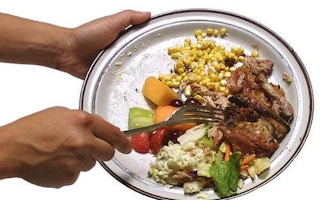From the factory right down to the dining table, more food is being dumped in Singapore.
A new record was set for food wastage last year as 703,200 tonnes were generated - a 26 per cent spike from the 558,900 tonnes produced in 2007.
This far outpaced the 15.8 per cent growth in the local population over the same period.
The National Environment Agency (NEA) said that besides population growth, a rise in tourist arrivals and increasing affluence had contributed to the problem.
Mr Jose Raymond, executive director of the Singapore Environment Council, said the “ease of accessibility to food and increased food variety” could also have worsened the wastage.
The problem has permeated every link of the supply chain. In a statement to The Straits Times, the NEA noted that food wastage “is being produced in homes, as well as food manufacturing and catering industries, foodcourts, restaurants, supermarkets and hawker centres”.
But the amount of food being recycled each year remains low.
Last year, only about 12 per cent of the total output in food waste was recycled, up 1.7 per cent from the previous year. This comprised mainly clean food waste like spent grains from beer brewing and bread waste, which are converted to animal feed.
The NEA said it is studying other recycling methods, taking into account cost-effectiveness, practicality and sustainability.
Through these methods, fertilisers and biogas - which can be used to generate electricity - can be produced.
For now, restaurants said it is difficult to track food wastage, though there have been efforts to minimise the problem. At WaWaWa Bistro and Shin-Sapporo Ramen, diners who are unable to finish their meals are encouraged to pack the food to take home.
Customers at Peach Garden restaurants are also advised against over-ordering, and at its buffet outlets, excessive food waste is chargeable.
But those in the catering business said they are in a quandary. They typically provide slightly more food for customers, just in case the amount is insufficient.
“We don’t want a situation where there is not enough food,” said Mr T.C. Ho, assistant director of sales and marketing at Peach Garden, which also provides catering services.
Meanwhile, most supermarkets here provide discounts on perishable items to clear stock.
Dairy Farm, which owns Giant and Cold Storage, also has an ordering guide and wastage monitoring system to track stock orders and wastage at each store daily.
Similar systems need to be adopted by other food-related businesses, said Mr Raymond.
“There is no legislation that addresses this issue and most companies either do not track or do not reveal the amount of food wastage generated in their premises,” he said. “At times, a lot of wastage occurs even before the product reaches the consumer.”










